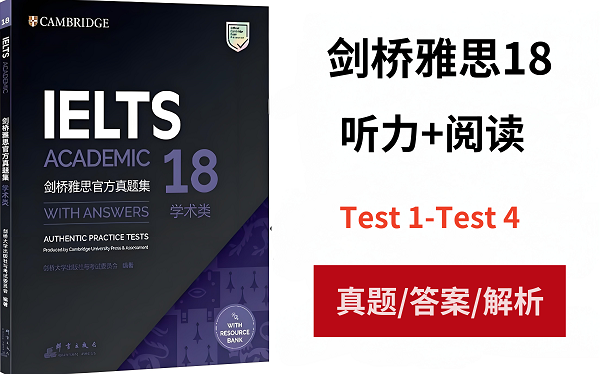剑桥18一共收集了雅思真题4套,下文羊驼小编整理了剑雅18第四套阅读真题原文Test 4 Reading Passage 2,以下是阅读部分第二篇文章Passage 2的文章原文及参考译文,供各位烤鸭们复习参考。想要了解更多关于剑雅17-19听力和阅读真题答案及解析的考生可查看剑雅17-19听力阅读真题答案及解析汇总,为助力各位烤鸭们备考雅思,羊驼教育雅思APP推出剑桥雅思真题及答案解析视频,可在羊驼雅思APP课程一栏获取剑桥雅思系列的视频信息。

READING PASSAGE 2
You should spend about 20 minutes on Questions 14-26,which are based on Reading Passage 2 below.
The growth mindset
Over the past century,a powerful idea has taken root in the educational landscape.The concept of intelligence as something innate has been supplanted by the idea that intelligence is not fixed,and that,with the right training,we can be the authors of our own cognitive capabilities.Psychologist Alfred Binet,the developer of the first intlligence tests,was one of many 19th-century scientists who held that earlier view and sought to quantify cognitive ability.Then,in the early 20th century, progressive thinkers revolted against the notion that inherent ability is destiny.Instead,educators such as John Dewey argued that every child's intelligence could be developed,given the right environment.
‘Growth mindset theory'is a relatively new-and extremely popular-version of this idea.In many schools today you will see hallways covered in motivational posters and hear speeches on the mindset of great sporting heroes who simply believed their way to the top.A major focus of the growth mindset in schools is coaxing students away from seeing failure as an indication of their ability,andtowards seeing it as a chance toimprove that ability.As educationalistJeff Howard noted several decades ago:‘Smart is not something that you just are,smart is something that you can get. ’
The idea of the growth mindset is based on the work of psychologist Carol Dweck in California in the 1990s.In one key experiment,Dweck divided a group of 10-to 12-year-olds into two groups.All were told that they had achieved a high score on a test but the firstgroup were praised for their intelligence in achieving this,while the others were praised for their effort.The second group-those who had been instilled with a‘growth mindset?-were subsequently far more likely to put effort into future tasks.Meanwhile,the former took on only those tasks that would not risk their sense of worth.This group had inferred that success or failure is due to innate ability, and this ‘fixed mindset'had led them to fear of failure and lack of effort.Praising ability actually made the students perform worse,while praising effort emphasised that change was possible.
One of the greatest impediments to successfully implementing a growth mindset,however, is the education system itself:in many parts of the world,the school climate is obsessed with performance in the form of constant testing,analysing and ranking of students-a key characteristic of the fixed mindset.Nor is it unusual for schools to create a certain cognitive dissonance,when they applaud the benefits of a growth mindset but then hand out fixed target grades in lessons based on performance.
Aside from the implementation problem,the original growth mindset research has also received
harsh criticism.The statistician Andrew Gelman claims that‘their research designs have enoughdegrees of freedom that they could take their data to support just about any theory at all'.Professor of Psychology Timothy Bates,who has been trying to replicate Dweck's work, is finding that the results are repeatedly null.He notes that:‘People with a growth mindset don't cope any better with failure ...Kids with the growth mindset aren't getting better grades,either before or after our intervention study.'
Much of this criticism is not lost on Dweck,and she deserves great credit for responding to it and adapting her work accordingly.In fact,she argues that her work has been misunderstood and misapplied in a range of ways.She has also expressed concerns that her theories are being misappropriated in schools by being conflated with the self-esteem movement:‘For me the growth mindset is a tool for learning and improvement.It's not just a vehicle for making children feel good.
But there is another factor at work here.The failure to translate the growth mindset into the classroom might reflect a misunderstanding of the nature of teaching and learning itself.Growth mindset supporters DavidYeager and Gregory Walton claim that interventions should be delivered in a subtle way to maximise their effectiveness.They say that if adolescents perceive a teacher's intervention as conveying that they are in need of help,this could undo its intended effects.
A lot of what drives students is their innate beliefs and how they perceive themselves.There is a strong correlation between self-perception and achievement,but there is evidence to suggest that the actual effect of achievement on self-perception is stronger than the other way round.To stand up in a classroom and successfully deliver a good speech is a genuine achievement,and that is likely to be more powerfully motivating than vague notions of‘motivation?itself.
Recent evidence would suggest that growth mindset interventions are not the elixir of student learning that its proponents claim it to be.The growth mindset appears to be a viable construct in the lab,which,when administered in the classroom via targeted interventions,doesn't seem to work.It is hard to dispute that having faith in the capacity to change is a good attribute for students.Paradoxically,however,that aspiration is not well served by direct interventions that try to instil it.
Motivational posters and talks are often a waste oftime,and might well give students a deluded notion of what success actually means.Teaching concrete skills such as how to write an effective introduction to an essay then praising students'effort in getting there is probably a far better way of improving confidence than telling them how unique they are,or indeed how capable they are of changing their own brains.Perhaps growth mindset works best as a philosophy and not an intervention.
点击图片查看剑雅17-19解析↓
剑雅18 Passage2原文翻译
成长型思维
在过去的一个世纪里,一种强有力的理念在教育领域生根发芽。智力是与生俱来的观念已经被智力不是固定不变的观念所取代,通过正确的训练,我们可以成为自己认知能力的创造者。心理学家阿尔弗雷德·比奈(Alfred Binet)是第一个智力测试的开发者,他是19世纪许多持有早期观点并试图量化认知能力的科学家之一。然后,在20世纪初,进步思想家们反对“天生能力就是命运”的观念。相反,约翰·杜威(John Dewey)等教育家认为,只要给予权利,每个孩子的智力都可以得到发展环境。
“成长心态理论”(Growth mindset theory)是这一观点的一个相对较新的版本,而且非常受欢迎。在今天,在许多学校,你会看到走廊上贴满了励志海报,听到演讲关于伟大的体育英雄的心态,他们只是相信自己通往顶峰的道路。在学校里,成长型思维模式的一个主要焦点是劝说学生不要把失败视为一种迹象他们的能力,并把它看作是一个提高能力的机会。作为educationalistJeff,霍华德几十年前就指出:“聪明不是你天生就有的东西,聪明是你能得到的东西。”
成长心态的概念是基于加州心理学家Carol Dweck的研究。在20世纪90年代。在一个关键的实验中,德韦克把一群10到12岁的孩子分成两组。所有人都被告知他们在测试中取得了高分,但第一组因为他们的智力而受到表扬,而另一组则因为他们的努力而受到表扬。第二个小组成员——那些被灌输了“成长心态”的人——随后更有可能为未来的任务付出努力。与此同时,前者只承担那些不会承担的任务拿他们的价值感冒险。这组人推断成功或失败是由于天生的能力,这种“固定的心态”导致他们害怕失败和缺乏努力。表扬能力实际上会让学生表现更差,而表扬努力则强调改变是可能的。
然而,成功实施成长型思维的最大障碍之一,是教育系统本身:在世界上的许多地方,学校的气氛是痴迷的以持续的测试、分析和学生排名的形式表现——这是关键固定心态的特点。学校在赞扬成长型思维模式的好处,但随后根据学生的表现在课堂上给出固定的目标分数,从而造成某种认知失调的情况也并不罕见。
除了实施问题,原有的成长心态研究也收到了严厉的批评。统计学家安德鲁·格尔曼(Andrew Gelman)声称,“他们的研究设计有足够的自由度,他们可以用数据支持几乎任何理论”。心理学教授蒂莫西·贝茨(Timothy Bates)一直在试图重复德韦克的研究,但他发现,研究结果一再无效。他指出:“拥有成长型思维模式的人不会更好地应对失败……无论是在我们的干预研究之前还是之后,拥有成长型思维模式的孩子都没有取得更好的成绩。”
德韦克并没有忽视这些批评,她对这些批评的回应值得称赞并相应地调整她的工作。事实上,她认为她的工作被误解了并以各种方式被误用。她也表达了自己的担忧,她的理论正在被在学校里被与自尊运动混为一谈而被滥用:“对我来说成长型思维是学习和进步的工具。它不仅仅是让孩子们感觉良好的工具。
但这里还有另一个因素在起作用。未能将成长型思维转化到课堂上,可能反映了对教与学本身本质的误解。成长心态的支持者大卫?耶格尔和格雷戈里?沃尔顿声称,干预措施应该以一种微妙的方式进行,以使其效果最大化。他们说如果是青少年把老师的干预看作是在传达他们需要帮助的信息,这可能会破坏其预期效果。
很多学生的动力是他们天生的信念和他们如何看待自己。自我认知和成就之间有很强的相关性,但有证据表明,成就对自我认知的实际影响比相反的影响更强。在教室里站起来,成功地发表了一篇精彩的演讲,这是一种真正的成就可能比“动机”本身的模糊概念更能激励人。
最近的证据表明,成长型思维干预并不像其支持者声称的那样是学生学习的灵丹妙药。在实验室里,成长型思维似乎是一种可行的结构,但在课堂上,通过有针对性的干预,这种结构似乎不起作用。毫无疑问,相信改变的能力对学生来说是一种好品质。然而,矛盾的是,试图灌输这种愿望的直接干预并没有很好地服务于这种愿望。励志海报和演讲往往是浪费时间,而且很可能会让学生对成功的真正含义产生误解。教授具体的技能,比如如何为一篇文章写一篇有效的引言,然后表扬学生在这方面的努力,可能要好得多而不是告诉他们他们是多么的独特,或者他们有多么有能力改变自己的大脑。也许成长心态作为一种哲学最有效,而不是一个干预。




